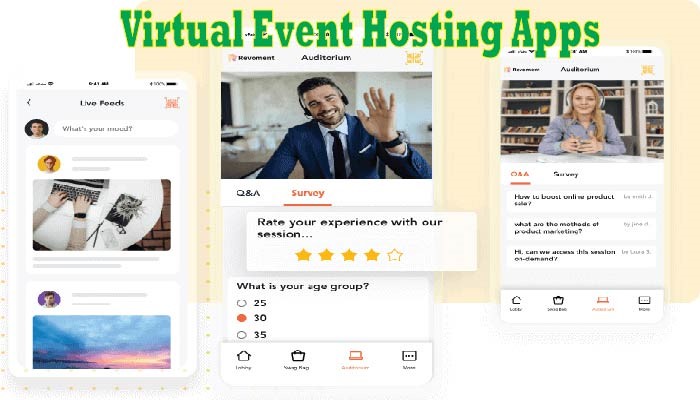Revolutionizing Events: The Rise of Virtual Event Hosting Apps
In the fast-paced digital era, the way we connect, communicate, and organize events has undergone a significant transformation. Virtual event hosting apps have emerged as powerful tools, providing a seamless and immersive experience for organizers and participants alike. In this article, we will delve into the world of virtual event hosting apps, exploring their features, benefits, and the impact they’ve had on the events industry.

The Evolution of Events in the Digital Age
1. Traditional Events vs. Virtual Events
The traditional model of organizing events required physical presence, often limiting attendance due to geographical constraints. Virtual event hosting apps have shattered these barriers, offering a global platform where participants can engage from the comfort of their homes.
2. The Need for Virtual Solutions
The COVID-19 pandemic acted as a catalyst for the adoption of virtual event hosting apps. With lockdowns and social distancing measures in place, the events industry faced unprecedented challenges. Virtual platforms became the go-to solution, enabling organizers to pivot seamlessly and continue delivering engaging experiences.
Key Features of Virtual Event Hosting Apps
1. Customizable Virtual Spaces
One of the standout features of virtual event hosting apps is the ability to create customized virtual spaces. Organizers can design interactive environments that mirror physical venues, complete with booths, stages, and networking areas. Attendees can navigate these spaces, fostering a sense of exploration and engagement.
2. Interactive Networking Tools
Building connections is a fundamental aspect of any event. Virtual event hosting apps go beyond traditional networking by offering innovative tools like AI-driven matchmaking, chat roulette-style introductions, and virtual business card exchanges. These features facilitate meaningful connections, replicating the serendipity of in-person networking.
3. Multimedia Integration
To keep participants captivated, virtual event hosting apps seamlessly integrate various multimedia elements. Live streams, pre-recorded videos, and interactive presentations enhance the overall experience. These features ensure that virtual events are not only informative but also visually engaging.
4. Analytics and Data Insights
Understanding attendee behavior and engagement is crucial for organizers to improve future events. Virtual event hosting apps provide robust analytics tools, offering insights into attendance patterns, popular sessions, and participant interactions. This data-driven approach empowers organizers to refine their strategies and deliver more impactful events.
The Benefits of Virtual Event Hosting Apps
1. Cost-Efficiency
Hosting physical events involves significant expenses related to venue rental, travel, accommodation, and logistics. Virtual events eliminate these costs, making them a more budget-friendly option. Organizers can redirect resources towards enhancing the virtual experience, ensuring a high return on investment.
2. Increased Accessibility
Virtual events break down geographical barriers, allowing participants from around the world to join without the constraints of travel. This increased accessibility not only expands the potential audience but also fosters diversity and inclusivity within the event community.
3. Flexibility and Convenience
Attendees can participate in virtual events from the comfort of their homes or offices, eliminating the need for travel and accommodation arrangements. This added flexibility not only saves time but also attracts a broader audience who might otherwise be unable to attend due to personal or professional commitments.
4. Eco-Friendly Approach
Reducing the carbon footprint is a growing concern in today’s world. Virtual events contribute to sustainability by minimizing the need for physical travel, reducing waste associated with on-site events, and embracing a more eco-friendly approach to large-scale gatherings.
Challenges and Solutions
1. Technical Glitches and Connectivity Issues
The virtual realm is not without its challenges. Technical glitches, poor internet connections, and compatibility issues can hinder the participant experience. However, advancements in technology and continuous updates from virtual event hosting apps providers aim to address these concerns, ensuring a smoother overall experience.
2. Maintaining Engagement in a Virtual Environment
Sustaining participant engagement throughout a virtual event poses a unique challenge. To counter this, organizers must focus on creating interactive and dynamic content, leveraging gamification elements, and encouraging active participation through polls, Q&A sessions, and virtual competitions.
Case Studies: Success Stories in Virtual Event Hosting
1. Global Tech Conferences
Major technology conferences, such as Google I/O and Microsoft Build, have successfully transitioned to virtual formats using specialized event hosting apps. These events attracted a global audience, showcasing the scalability and reach achievable through virtual platforms.
2. Niche Industry Expos
Virtual event hosting has proven effective for niche industry expos, enabling targeted networking and knowledge-sharing. Events like virtual trade shows and medical conferences have flourished in the digital landscape, providing industry professionals with a platform to connect and stay updated on the latest developments.
Future Trends in Virtual Event Hosting
1. Hybrid Events
As the world adapts to the new normal, the concept of hybrid events is gaining traction. Combining elements of both physical and virtual experiences, hybrid events offer flexibility for attendees to choose their preferred mode of participation. Virtual event hosting apps are evolving to seamlessly integrate these hybrid models.
2. Enhanced AI and VR Integration
The future of virtual event hosting will likely see enhanced integration of artificial intelligence (AI) and virtual reality (VR). AI algorithms will refine matchmaking processes, while VR technologies will create more immersive and lifelike virtual environments, providing an even more authentic experience.
Conclusion
Virtual event hosting apps have revolutionized the events industry, offering a dynamic and accessible alternative to traditional gatherings. As technology continues to advance, these platforms will play an increasingly vital role in shaping the future of events. Whether it’s a global tech conference, a niche industry expo, or a local meet-up, virtual event hosting apps have proven their versatility and adaptability, providing organizers and participants with a new frontier for connection and collaboration.



